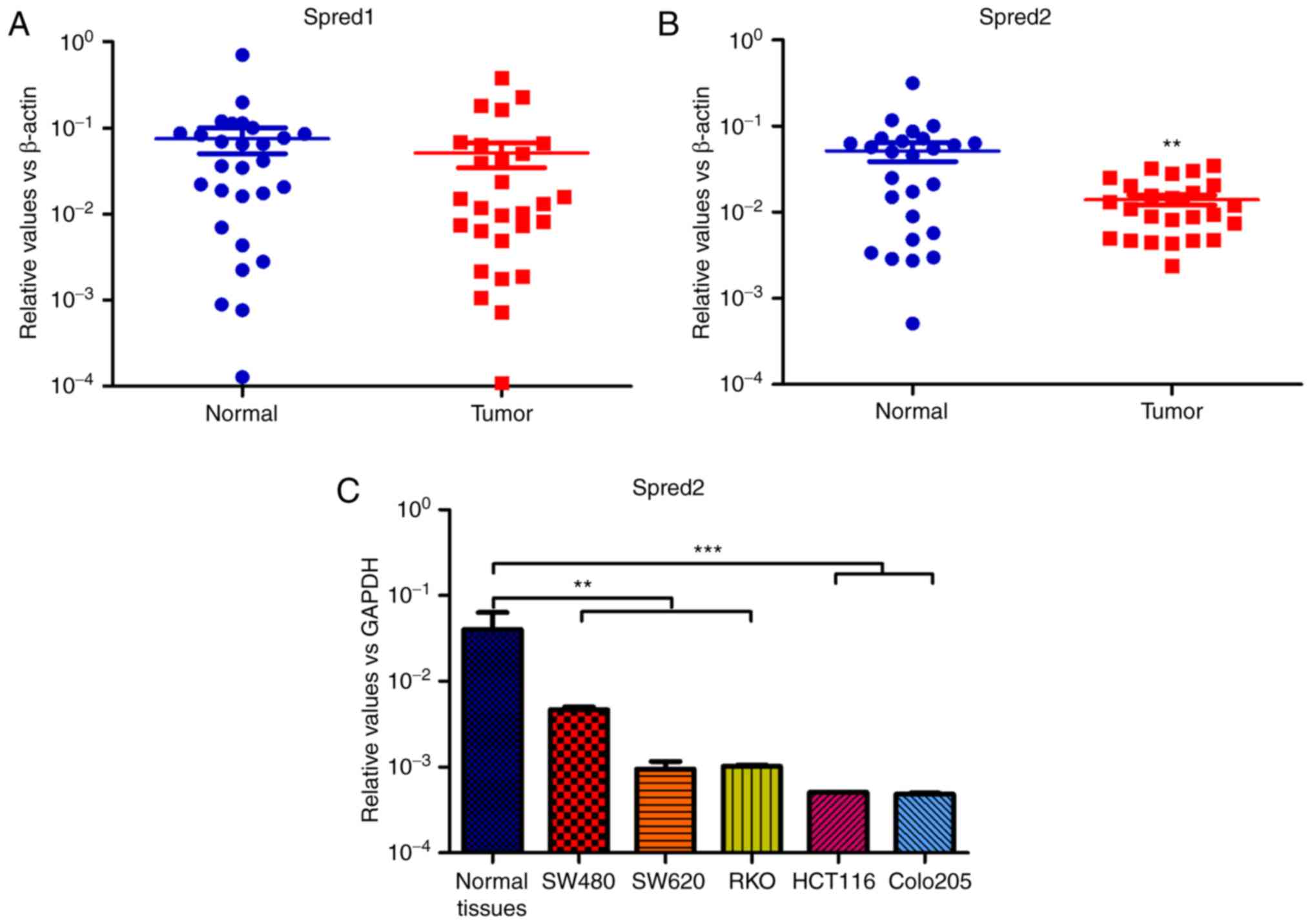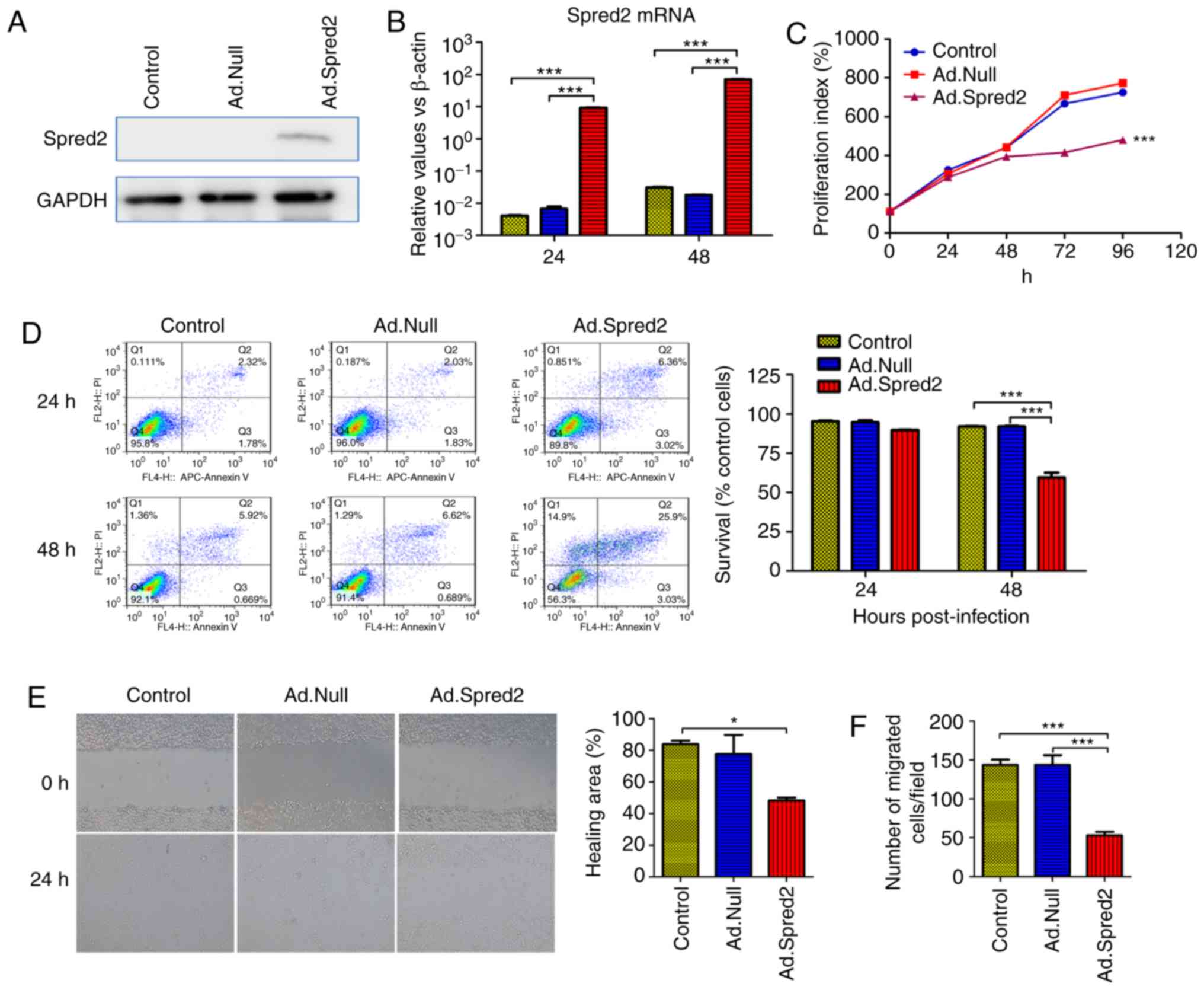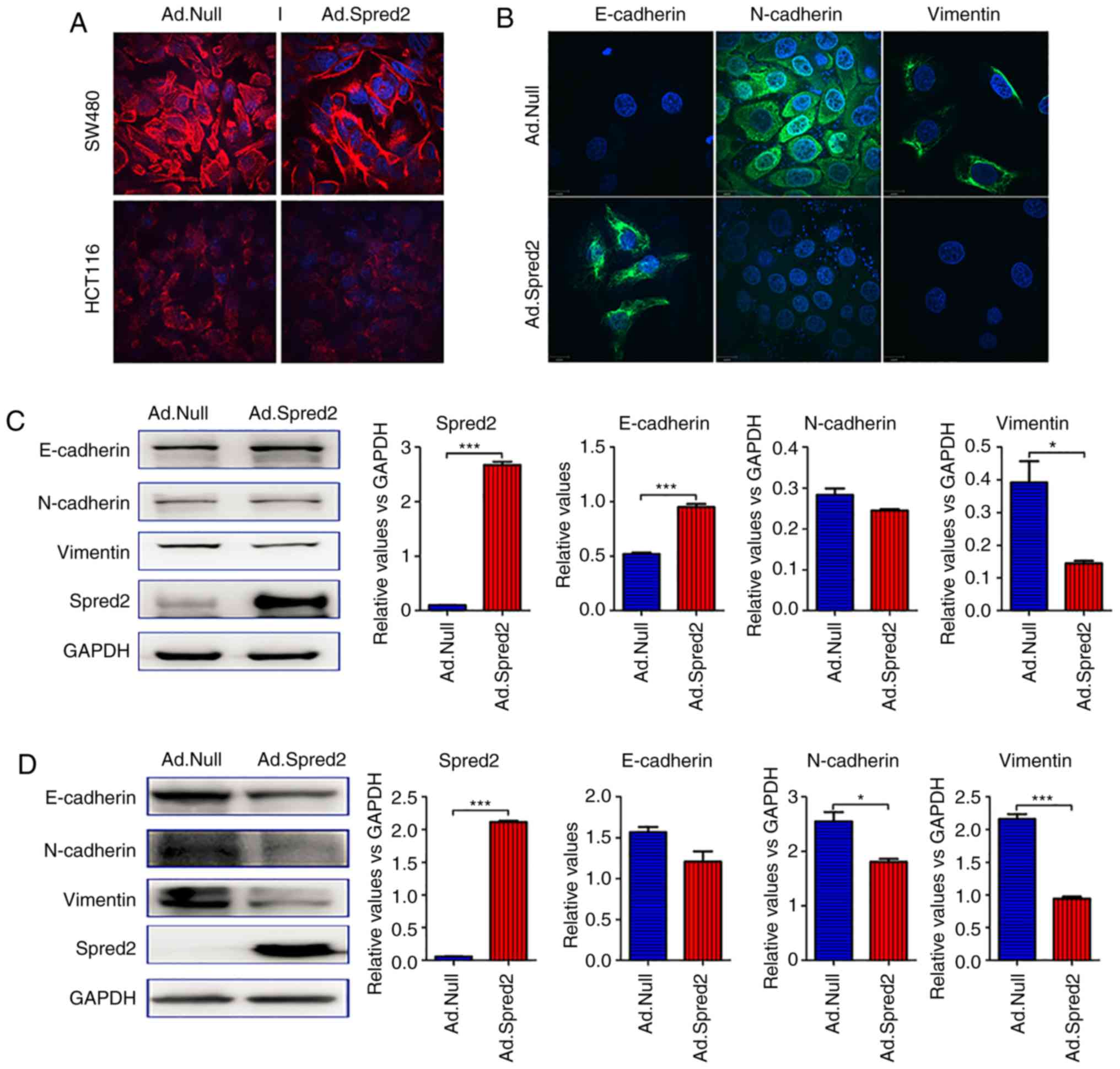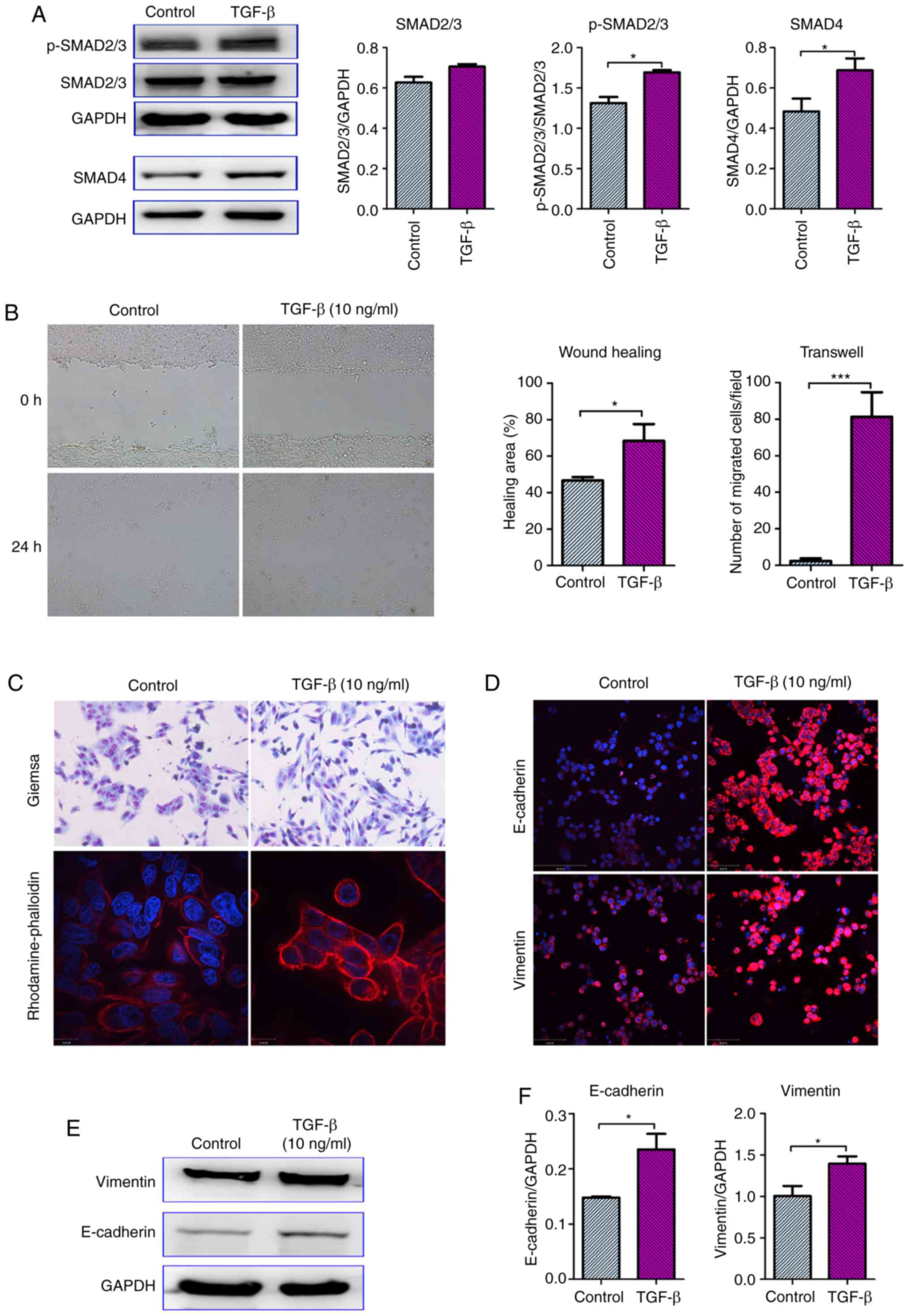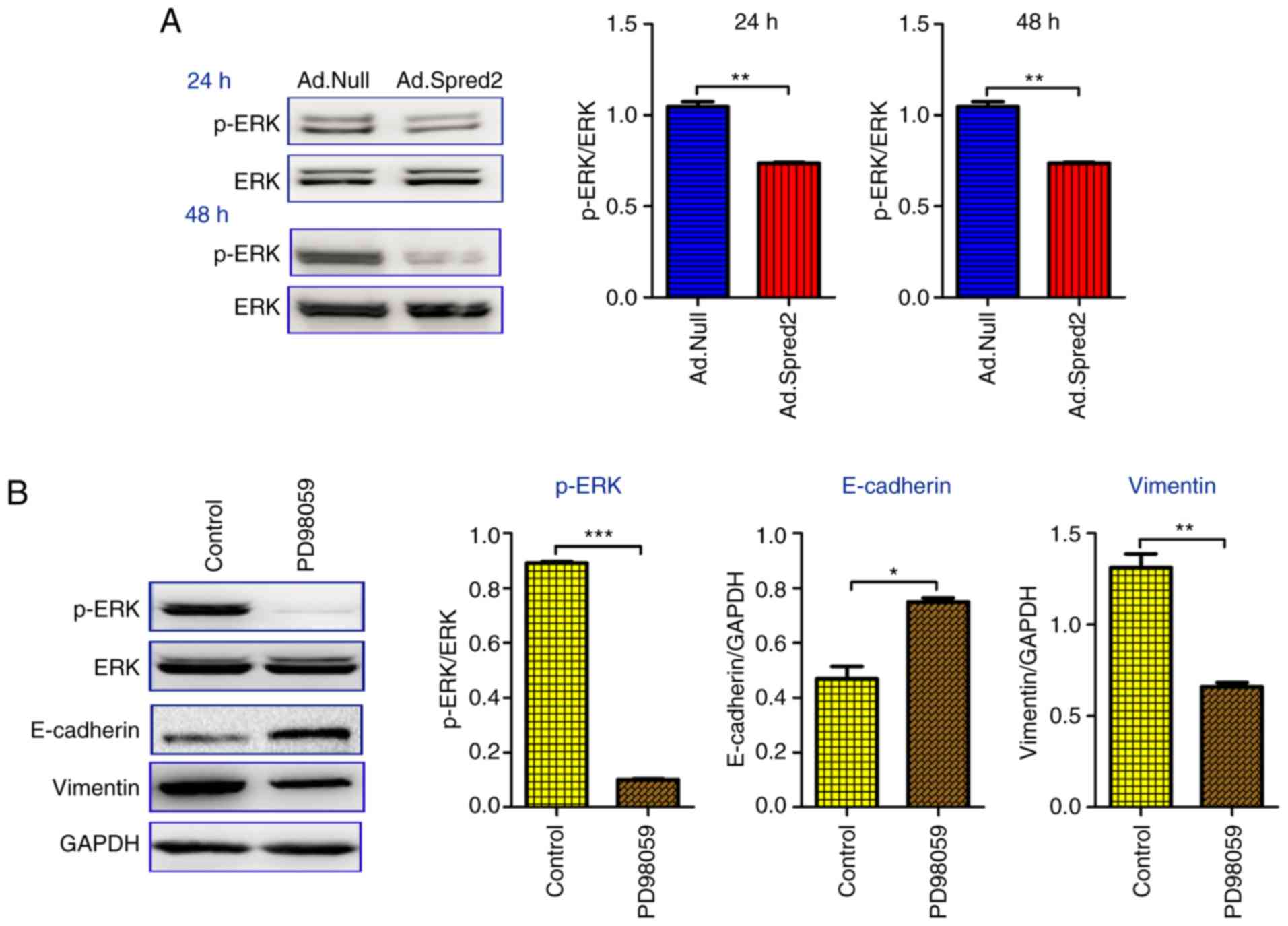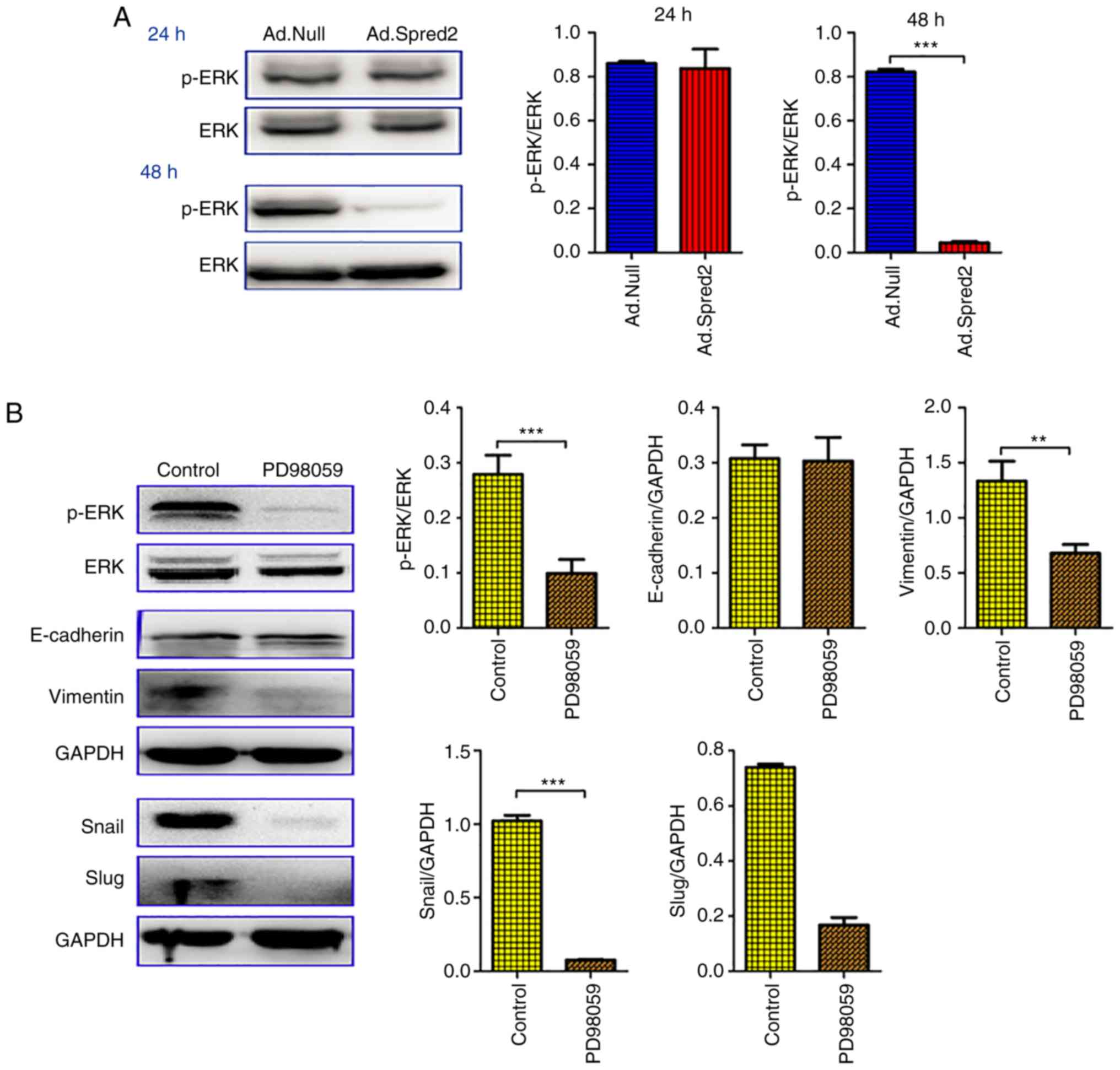|
1
|
Bray F, Ferlay J, Soerjomataram I, Siegel
RL, Torre LA and Jemal A: Global cancer statistics 2018: GLOBOCAN
estimates of incidence and mortality worldwide for 36 cancers in
185 countries. CA Cancer J Clin. 68:394–424. 2018. View Article : Google Scholar : PubMed/NCBI
|
|
2
|
Siegel RL, Miller KD, Fedewa SA, Ahnen DJ,
Meester RGS, Barzi A and Jemal A: Colorectal cancer statistics,
2017. CA Cancer J Clin. 67:177–193. 2017. View Article : Google Scholar : PubMed/NCBI
|
|
3
|
Gonzalez-Pons M and Cruz-Correa M:
Colorectal cancer bio-markers: Where are we now? Biomed Res Int.
2015:1490142015. View Article : Google Scholar : PubMed/NCBI
|
|
4
|
Brenner H, Stock C and Hoffmeister M:
Colorectal cancer screening: The time to act is now. BMC Med.
13:2622015. View Article : Google Scholar : PubMed/NCBI
|
|
5
|
Wrobel P and Ahmed S: Current status of
immunotherapy in metastatic colorectal cancer. Int J Colorectal
Dis. 34:13–25. 2019. View Article : Google Scholar : PubMed/NCBI
|
|
6
|
Van der Jeught K, Xu HC, Li YJ, Lu XB and
Ji G: Drug resistance and new therapies in colorectal cancer. World
J Gastroenterol. 24:3834–3848. 2018. View Article : Google Scholar : PubMed/NCBI
|
|
7
|
Li Y, Zhang M, Dorfman RG, Pan Y, Tang D,
Xu L, Zhao Z, Zhou Q, Zhou L, Wang Y, et al: SIRT2 promotes the
migration and invasion of gastric cancer through RAS/ERK/JNK/MMP-9
pathway by increasing PEPCK1-related metabolism. Neoplasia.
20:745–756. 2018. View Article : Google Scholar : PubMed/NCBI
|
|
8
|
Qiu XY, Hu DX, Chen WQ, Chen RQ, Qian SR,
Li CY, Li YJ, Xiong XX, Liu D, Pan F, et al: PD-L1 confers
glioblastoma multiforme malignancy via Ras binding and Ras/Erk/EMT
activation. Biochim Biophys Acta Mol Basis Dis. 1864:1754–1769.
2018. View Article : Google Scholar : PubMed/NCBI
|
|
9
|
Wu D, Zhao B, Qi X, Peng F, Fu H, Chi X,
Miao QR and Shao S: Nogo-B receptor promotes epithelial-mesenchymal
transition in non-small cell lung cancer cells through the
Ras/ERK/Snail1 pathway. Cancer Lett. 418:135–146. 2018. View Article : Google Scholar : PubMed/NCBI
|
|
10
|
Hu YC, Wang AM, Lu JK, Cen R and Liu LL:
Long noncoding RNA HOXD-AS1 regulates proliferation of cervical
cancer cells by activating Ras/ERK signaling pathway. Eur Rev Med
Pharmacol Sci. 21:5049–5055. 2017.PubMed/NCBI
|
|
11
|
Wakioka T, Sasaki A, Kato R, Shouda T,
Matsumoto A, Miyoshi K, Tsuneoka M, Komiya S, Baron R and Yoshimura
A: Spred is a sprouty-related suppressor of ras signalling. Nature.
412:647–651. 2001. View
Article : Google Scholar : PubMed/NCBI
|
|
12
|
Nobuhisa I, Kato R, Inoue H, Takizawa M,
Okita K, Yoshimura A and Taga T: Spred-2 suppresses
aorta-gonad-mesonephros hematopoiesis by inhibiting MAP kinase
activation. J Exp Med. 199:737–742. 2004. View Article : Google Scholar : PubMed/NCBI
|
|
13
|
Kachroo N, Valencia T, Warren AY and
Gnanapragasam VJ: Evidence for downregulation of the negative
regulator SPRED2 in clinical prostate cancer. Br J Cancer.
108:597–601. 2013. View Article : Google Scholar : PubMed/NCBI
|
|
14
|
Ma XN, Liu XY, Yang YF, Xiao FJ, Li QF,
Yan J, Zhang QW, Wang LS, Li XY and Wang H: Regulation of human
hepatocellular carcinoma cells by Spred2 and correlative studies on
its mechanism. Biochem Biophys Res Commun. 410:803–808. 2011.
View Article : Google Scholar : PubMed/NCBI
|
|
15
|
Momeny M, Khorramizadeh MR, Ghaffari SH,
Yousefi M, Yekaninejad MS, Esmaeili R, Jahanshiri Z and Nooridaloii
MR: Effects of silibinin on cell growth and invasive properties of
a human hepatocellular carcinoma cell line, HepG-2, through
inhibition of extracellular signal-regulated kinase 1/2
phosphorylation. Eur J Pharmacol. 591:13–20. 2008. View Article : Google Scholar : PubMed/NCBI
|
|
16
|
Yoshida T, Hisamoto T, Akiba J, Koga H,
Nakamura K, Tokunaga Y, Hanada S, Kumemura H, Maeyama M, Harada M,
et al: Spreds, inhibitors of the Ras/ERK signal transduction, are
dysregulated in human hepatocellular carcinoma and linked to the
malignant phenotype of tumors. Oncogene. 25:6056–6066. 2006.
View Article : Google Scholar : PubMed/NCBI
|
|
17
|
Liu XY, Yang YF, Wu CT, Xiao FJ, Zhang QW,
Ma XN, Li QF, Yan J, Wang H and Wang LS: Spred2 is involved in
imatinib-induced cytotoxicity in chronic myeloid leukemia cells.
Biochem Biophys Res Commun. 393:637–642. 2010. View Article : Google Scholar : PubMed/NCBI
|
|
18
|
Lu ZZ, Ni F, Hu ZB, Wang L, Wang H, Zhang
QW, Huang WR, Wu CT and Wang LS: Efficient gene transfer into
hematopoietic cells by a retargeting adenoviral vector system with
a chimeric fiber of adenovirus serotype 5 and 11p. Exp Hematol.
34:1171–1182. 2006. View Article : Google Scholar : PubMed/NCBI
|
|
19
|
Xu W, Neill T, Yang Y, Hu Z, Cleveland E,
Wu Y, Hutten R, Xiao X, Stock SR, Shevrin D, et al: The systemic
delivery of an oncolytic adenovirus expressing decorin inhibits
bone metastasis in a mouse model of human prostate cancer. Gene
Ther. 22:247–256. 2015. View Article : Google Scholar : PubMed/NCBI
|
|
20
|
Livak KJ and Schmittgen TD: Analysis of
relative gene expression data using real-time quantitative PCR and
the 2(-Delta Delta C(T)) method. Methods. 25:402–408. 2001.
View Article : Google Scholar : PubMed/NCBI
|
|
21
|
Huang Y, Li G, Wang K, Mu Z, Xie Q, Qu H,
Lv H and Hu B: Collagen type VI alpha 3 chain promotes
epithelial-mesenchymal transition in bladder cancer cells via
transforming growth factor β (TGF-β)/Smad pathway. Med Sci Monit.
24:5346–5354. 2018. View Article : Google Scholar : PubMed/NCBI
|
|
22
|
Thakur AK, Nigri J, Lac S, Leca J, Bressy
C, Berthezene P, Bartholin L, Chan P, Calvo E, Iovanna JL, et al:
TAp73 loss favors Smad-independent TGF-β signaling that drives EMT
in pancreatic ductal adenocarcinoma. Cell Death Differ.
23:1358–1370. 2016. View Article : Google Scholar : PubMed/NCBI
|
|
23
|
Han S, Bui NT, Ho MT, Kim YM, Cho M and
Shin DB: Dexamethasone inhibits TGF-β1-induced cell migration by
regulating the ERK and AKT pathways in human colon cancer cells via
CYR61. Cancer Res Treat. 48:1141–1153. 2016. View Article : Google Scholar : PubMed/NCBI
|
|
24
|
Lampropoulos P, Zizi-Sermpetzoglou A,
Rizos S, Kostakis A, Nikiteas N and Papavassiliou AG: TGF-β
signalling in colon carcinogenesis. Cancer Lett. 314:1–7. 2012.
View Article : Google Scholar : PubMed/NCBI
|
|
25
|
Elez E, Argiles G and Tabernero J:
First-line treatment of metastatic colorectal cancer: Interpreting
FIRE-3, PEAK, and CALGB/SWOG 80405. Curr Treat Options Oncol.
16:522015. View Article : Google Scholar : PubMed/NCBI
|
|
26
|
Fakih MG: Metastatic colorectal cancer:
Current state and future directions. J Clin Oncol. 33:1809–1824.
2015. View Article : Google Scholar : PubMed/NCBI
|
|
27
|
Cakir M and Grossman AB: Targeting MAPK
(Ras/ERK) and PI3K/Akt pathways in pituitary tumorigenesis. Expert
Opin Ther Targets. 13:1121–1134. 2009. View Article : Google Scholar : PubMed/NCBI
|
|
28
|
Khavari TA and Rinn J: Ras/Erk MAPK
signaling in epidermal homeostasis and neoplasia. Cell Cycle.
6:2928–2931. 2007. View Article : Google Scholar : PubMed/NCBI
|
|
29
|
Torii S, Yamamoto T, Tsuchiya Y and
Nishida E: ERK MAP kinase in G cell cycle progression and cancer.
Cancer Sci. 97:697–702. 2006. View Article : Google Scholar : PubMed/NCBI
|
|
30
|
Samatar AA and Poulikakos PI: Targeting
RAS-ERK signalling in cancer: Promises and challenges. Nat Rev Drug
Discovery. 13:928–942. 2014. View Article : Google Scholar : PubMed/NCBI
|
|
31
|
Pastushenko I and Blanpain C: EMT
transition states during tumor progression and metastasis. Trends
Cell Biol. 29:212–226. 2019. View Article : Google Scholar : PubMed/NCBI
|
|
32
|
Chen T, You Y, Jiang H and Wang ZZ:
Epithelial-mesenchymal transition (EMT): A biological process in
the development, stem cell differentiation, and tumorigenesis. J
Cell Physiol. 232:3261–3272. 2017. View Article : Google Scholar : PubMed/NCBI
|
|
33
|
Kim DH, Xing T, Yang Z, Dudek R, Lu Q and
Chen YH: Epithelial mesenchymal transition in embryonic
development, tissue repair and cancer: A comprehensive overview. J
Clin Med. 7:E12017. View Article : Google Scholar : PubMed/NCBI
|
|
34
|
Tan QY and Cheng ZS: TGFβ1-smad signaling
pathway participates in interleukin-33 induced
epithelial-to-mesenchymal transition of A549 cells. Cell Physiol
Biochem. 50:757–767. 2018. View Article : Google Scholar : PubMed/NCBI
|
|
35
|
Zhao G, Wojciechowski MC, Jee S, Boros J,
McAvoy JW and Lovicu FJ: Negative regulation of TGFβ-induced lens
epithelial to mesenchymal transition (EMT) by RTK antagonists. Exp
Eye Res. 132:9–16. 2015. View Article : Google Scholar : PubMed/NCBI
|
|
36
|
Villar V, Kocic J and Santibanez JF:
Spred2 inhibits TGF-beta1-induced urokinase type plasminogen
activator expression, cell motility and epithelial mesenchymal
transition. Int J Cancer. 127:77–85. 2010. View Article : Google Scholar : PubMed/NCBI
|
|
37
|
Xu J, Zhou J, Dai H, Liu F, Li W, Wang W
and Guo F: CHIP functions as an oncogene by promoting colorectal
cancer metastasis via activation of MAPK and AKT signaling and
suppression of E-cadherin. J Transl Med. 16:1692018. View Article : Google Scholar : PubMed/NCBI
|
|
38
|
Jiang J, Yi B, Qin C, Ding S and Cao W:
Upregulation of microRNA27b contributes to the migration and
invasion of gastric cancer cells via the inhibition of
sprouty2-mediated ERK signaling. Mol Med Rep. 13:2267–2272. 2016.
View Article : Google Scholar : PubMed/NCBI
|















